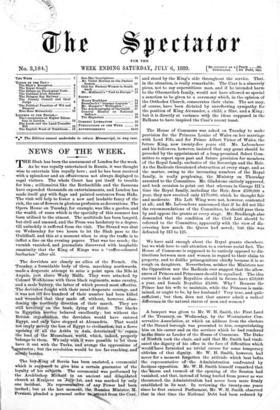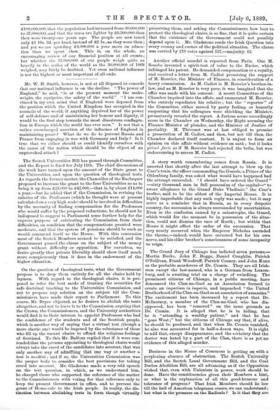A banquet was given to Mr. W. H. Smith, the
First Lord of the Treasury, on Wednesday, by the Westminster Con- servative Association, at which an address from the electors of the Strand borough was presented to him, congratulating him on his career and on the services which he had rendered tolthe State as Leader of the House of Commons. The Duke of Norfolk took the chair, and said that Mr. Smith had vindi- cated the dignity of his office in the face of difficulties which wouldliave furnished no trivial excuse for some temporary oblivion of that dignity. Mr. W. H. Smith, however, had never for a moment forgotten the attitude which best befits the representative of the Administration confronted by factious opposition. Mr. W. H. Smith himself remarked that thelitorm and turmoil of the opening of the Session had vanished, and that, instead of being hurled from power as was threatened, the Administration had never been more firmly established in its seat. In reviewing the twenty-one years since he first entered Parliament, Mr. W. H. Smith observed that hi that time the National Debt had been reduced by 2100,000,000, that the population had increased from 30,000,000 to 37,000,000, and that the taxes are lighter by £6,300,000 than they were twenty-one years ago. The people are now taxed only £1 19s. 3d. per head, instead of £2 ls.,es they were then ; and yet we are spending £4,000,000 a year more on educa- tion than we spent then. This is, on the whole, an encouraging review of our financial position at all events ; but whether the 37,000,000 of our people weigh quite as heavily in the scales of the world as the 30,000,000 of 1868 weighed, may fairly be doubted. Yet-even national influence is not the highest or most important of all ends.











































 Previous page
Previous page